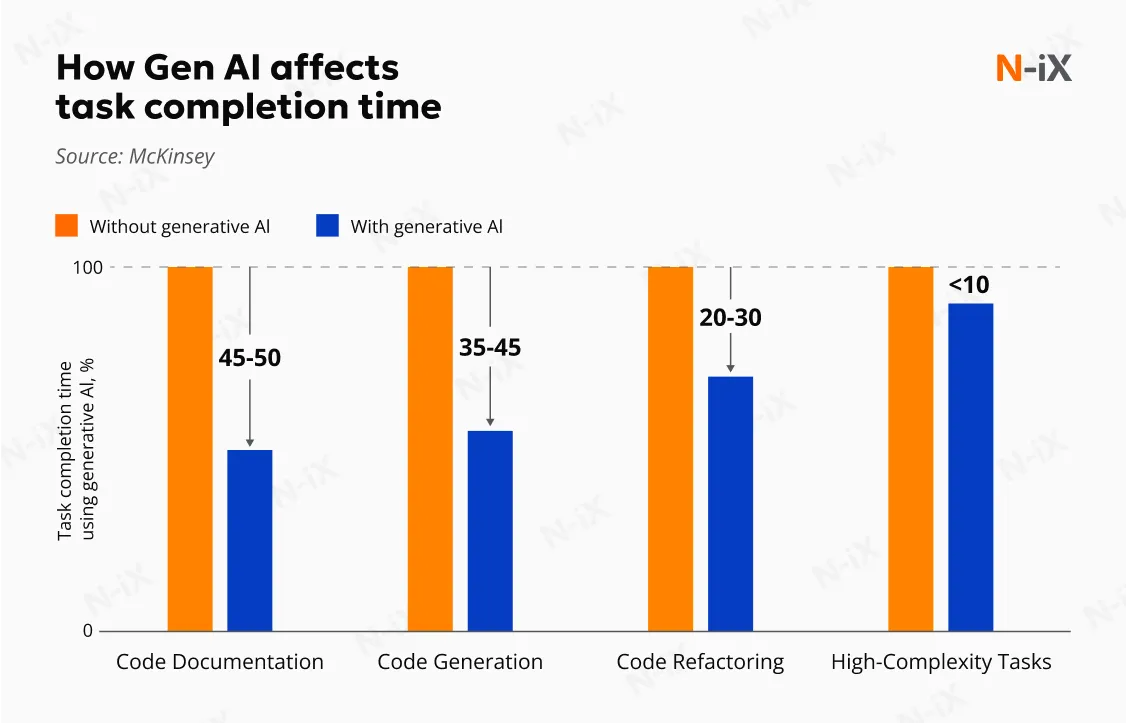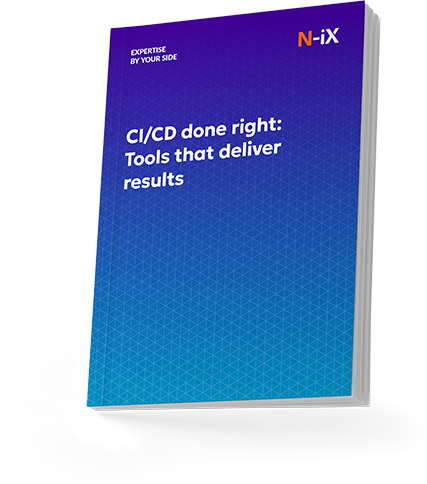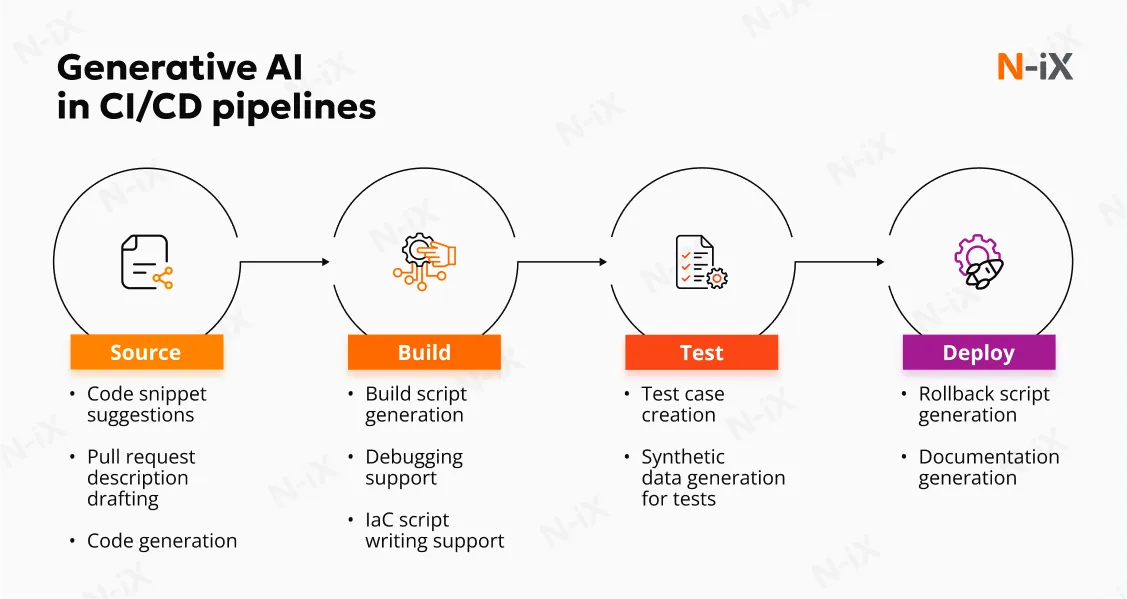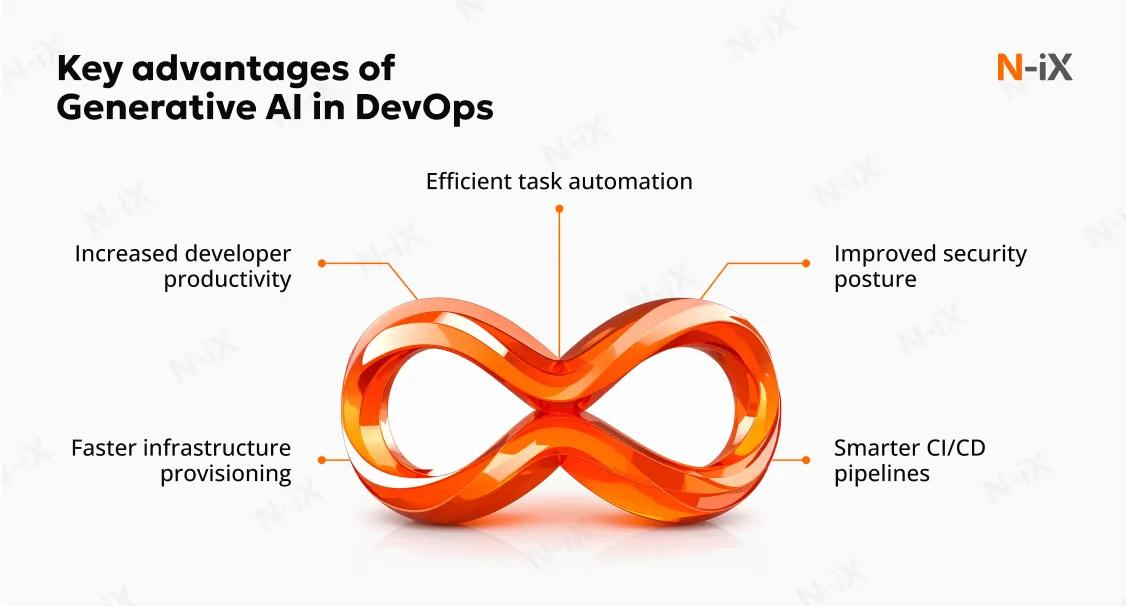Automation has always been at the heart of DevOps practices. But eventually, even the most efficient pipelines hit a ceiling: you can only write, test, and deploy so fast. That’s where Generative AI in DevOps brings fresh possibilities. It takes over routine tasks like code documentation and script writing, often cutting effort in half.

While it isn’t designed for highly complex tasks, Gen AI excels at handling time-consuming and repetitive work with remarkable efficiency and accuracy. Want to learn which processes it can streamline and how to overcome implementation challenges? Explore our expert guide.
Key applications of Generative AI in DevOps
When you think about AI in any aspect of business, traditional automation and analytics likely come to mind. But Generative AI introduces a new layer of intelligence. Beyond boosting productivity, this technology transforms how teams approach software development, testing, and deployment. In particular, it’s useful for the following tasks:
Code generation and debugging automation
Coding assistance is among the most widespread Generative AI use cases in DevOps. When properly implemented, tools like GitHub Copilot help software engineers finish coding tasks 55% faster than without AI support. They excel at completing lines of code and even generating entire scripts based on natural language descriptions. By automating repetitive coding tasks, AI solutions allow teams to focus on more complex business-critical assignments.
Such tools also provide real-time feedback on potential bugs and advise on how to improve code quality. This helps teams write cleaner, more maintainable code with less effort, accelerating development cycles.
Build high-performing pipelines with the right CI/CD tools—get the guide now!


Success!

CI/CD pipeline optimization
Continuous integration and delivery pipelines form the backbone of DevOps. They help push code to production faster and with fewer errors, automating the whole build, test, and deployment cycle. But they’re not efficient by default. Imagine a pipeline that takes 40 minutes to run, even for a minor update. Or the one that fails unpredictably because of overlooked test dependencies. So, how can you avoid such pitfalls and build robust pipelines?
Generative AI for DevOps may be the answer. It learns from previous pipeline runs and your system’s context to detect bottlenecks and suggest improvements. Our DevOps experts say the best way to apply Gen AI depends on your infrastructure and goals. Still, in practice, we often see the most value in these areas:
- Auto-generating pipeline configs based on your project structure, creating YAML or JSON files for CI/CD tools like GitHub Actions, GitLab, or Jenkins;
- Optimizing pipeline logic by parallelizing jobs, skipping redundant steps, or prioritizing critical tests;
- Predicting pipeline issues by learning from past builds and highlighting likely failure points before execution;
- Triggering builds intelligently by analyzing code changes and deciding which updates need a full pipeline run;
- Reducing downtime and manual intervention with AI-driven self-diagnosis and self-healing.

Test data and case creation
Creating comprehensive test scenarios has traditionally been time-consuming and limited by human imagination. Gen AI in DevOps addresses this challenge by automatically generating diverse and realistic test data that mimics real-world scenarios.
According to our QA specialists at N-iX, AI can cover even the most complex domains, generating the following:
- Synthetic data that reflects production behavior without exposing sensitive information;
- Edge cases that human testers might overlook;
- Culturally appropriate test data for global applications;
- Domain-specific data tailored to industry regulations, such as in finance or healthcare;
- Dynamic test sets that evolve based on recent code or requirement changes.
AI can also learn from real user stories and business requirements to create detailed test cases, significantly reducing manual effort. This approach ensures more thorough testing coverage and identifies bugs before they reach production.
Issue prediction and root cause analysis
Production issues are usually diagnosed by analytically oriented Machine Learning algorithms, not generative. However, Generative AI in DevOps increasingly acts as a human-facing assistant to traditional AI. While other models assess logs and metrics to detect anomalies, Gen AI steps in to help teams make sense of such insights. It translates complex system signals into clear, actionable explanations. In a way, it acts like an experienced engineer walking the team through what went wrong.
As a result, you can receive concise summaries, likely root causes, and even recommended fixes. This helps avoid manually combing through dashboards and logs, speeding up the resolution of most issues.
Security and compliance automation
One of the objectives of DevSecOps is to make security less manual and more proactive. Gen AI can be particularly valuable for automating numerous security processes. For instance, AI-powered tools can analyze code for vulnerabilities and flag misconfigurations. They can even rewrite code on the fly, directly in the development workflow. AI can also generate threat models, security documentation, and compliance reports based on natural language input or existing system data.
Infrastructure as code (IaC) enhancements
Infrastructure as code has changed how teams provision and manage resources. Yet, building clean and efficient IaC takes significant time and expertise. Generative AI and DevOps come together to simplify this process. Gen AI accelerates provisioning and reduces human error by turning natural language instructions into deployable infrastructure. It also helps maintain consistency across environments and adapt to changing needs more easily.
Here are several examples of what you can do with Gen AI:
- Generate IaC templates from plain-text inputs, creating Terraform or CloudFormation scripts that align with best practices;
- Validate and fix configurations by comparing them against your security and operational policies;
- Create tailored configurations for development, test, and production environments, adjusting resources according to usage;
- Refactor and document existing IaC, improving its readability and maintainability without manual rewriting.

4 obstacles to Generative AI in DevOps adoption and how to overcome them
Generative AI brings powerful capabilities to DevOps environments but also introduces significant challenges that teams must address. Let’s discuss four roadblocks companies often encounter when developing a Gen AI strategy and how to get past them.
1. Poor training data leading to errors and vulnerabilities
The effectiveness of a Gen AI model depends on the quality and structure of training data. Low-quality data leads to incorrect predictions and unreliable automation, ultimately affecting system performance.
While DevOps environments generate abundant operational data, this information often lacks proper labeling, consistency, and accessibility. Consequently, AI systems trained on it may approve unsafe code, creating security vulnerabilities. Another common issue is “package hallucination,” where AI suggests dependencies that don’t actually exist. This disrupts deployments and increases maintenance overhead.
Our experts recommend establishing strong data governance practices early in your Generative AI DevOps journey to prevent these issues. This includes validating training datasets, removing outdated records, and continuously updating models with relevant inputs. By ensuring your AI systems are trained on reliable data, you reduce the risk of errors and improve the accuracy of automated decisions.
2. Skill gaps in AI and DevOps teams
The skills shortage remains a major barrier to Gen AI in DevOps. Many organizations lack DevOps and Generative AI expertise, making it difficult to design, deploy, and maintain intelligent pipelines. Even experienced teams often struggle to balance infrastructure needs with fast-changing AI demands.
To bridge this gap, businesses are increasingly partnering with technology consultants who specialize in Generative AI implementation. Trusted firms like N-iX help integrate Gen AI into your DevOps workflows by combining cloud engineering expertise with AI proficiency. By delegating such tasks to skilled professionals, you can accelerate adoption, optimize costs, and ensure the solution fits your tech stack and strategic goals.
3. Security and compliance risks associated with AI
Despite its advantages, Generative AI in DevOps introduces valid security and privacy concerns. These models rely on vast datasets, some of which may include sensitive or proprietary information. If not handled properly, AI systems can unintentionally expose confidential data, especially when integrated into CI/CD or infrastructure workflows.
To prevent data exposure, N-iX experts recommend isolating Gen AI environments from production. They also advise using depersonalized or synthetic data for model training to avoid handling real user information. Combined with effective access controls and regular security audits, this approach helps minimize risk and ensure compliance from the start.
4. Integration complexity with legacy systems
Legacy environments create unique obstacles for Gen AI adoption. Integrating AI into existing DevOps processes, especially when it comes to legacy systems, often results in compatibility issues. Several common architectural constraints include:
- Monolithic architectures that are difficult to refactor or modularize;
- Outdated CI/CD pipelines not built to support AI tooling;
- Custom-built systems with limited documentation;
- Fragmented data sources that hinder model training;
- Lack of APIs or integration points for automation tools;
- Inflexible infrastructure that can’t support dynamic resource allocation.
Our DevOps engineers note that it’s sometimes necessary to redesign legacy systems to fully support AI capabilities. However, this doesn’t have to mean starting from scratch. A more practical approach is to implement Gen AI in incremental steps, beginning with non-critical workflows. This allows you to test integrations, identify bottlenecks, and determine how to gradually adjust your architecture.
Conclusion
Generative AI in DevOps has immense potential. Instead of replacing proven methods, it enhances existing processes, helping teams write code, build pipelines, and handle infrastructures more efficiently. Forward-thinking companies already use it to reduce release time, lower mistake rates, and make better decisions throughout the software creation process.
But tapping into this power requires more than just the right technology. Successful implementation needs a clear strategy and hands-on expertise to work around old systems and deal with scattered data. With an experienced partner to guide integration, you can move beyond experimentation and turn Gen AI into a real operational advantage.
Why partner with N-iX for your DevOps AI initiatives?
- N-iX delivers tailored Gen AI, cloud, and DevOps solutions for over 160 clients across multiple industries, including finance, manufacturing, and technology sectors.
- Our team of 2,400 tech experts includes more than 70 seasoned DevOps specialists and over 200 AI and data engineers with proven expertise in Generative AI implementation.
- N-iX has successfully delivered over 150 DevOps projects in the past five years, helping clients optimize workflows, automate processes, and integrate AI capabilities.
- We maintain partnerships with all major cloud providers as an AWS Premier Tier Services Partner, Microsoft Solutions Partner, and Google Cloud Platform Partner.
- We uphold compliance with rigorous security standards, including ISO 27001, PCI DSS, and SOC 2, ensuring your AI implementations meet enterprise security requirements.
Have a question?
Speak to an expert




